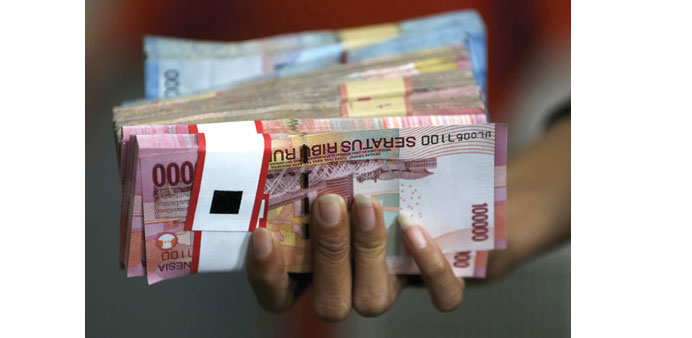An employee of a money changer holds a stack of Indonesia rupiah notes before giving it to a customer in Jakarta. Last week the rupiah surged 8.9%, on course for the best five-day streak since 2001.
Bloomberg
Jakarta
Now that Indonesia and Brazil share the same debt rating, investors are evaluating the two. Most say the Southeast Asian nation comes off best.
The biggest economies in Southeast Asia and South America both rely on commodity exports. Their populations exceed 200mn and they have similar literacy and life expectancy rates. Their currencies have weakened sharply over the last 12 months, sparking a round of defaults. Last month, Standard & Poor’s added another parallel to the list by downgrading Brazil to BB+, the highest junk grade and the same score as Indonesia.
For money managers, that’s where the similarities end. The extra premium investors demand to hold Brazil sovereign dollar bonds due 2025 has surged 156 basis points this year versus just 12 basis points for 10-year Indonesian notes. Brazil’s debt is 59.3% of gross domestic product, more than double Indonesia’s 23.9%. And President Joko Widodo is jump starting infrastructure projects while Brazil’s Dilma Rousseff may face an impeachment.
“Brazil’s domestic fiscal metrics are far worse than Indonesia’s,” said Jonathan Lemco, a senior sovereign analyst at Vanguard Group, which manages some $3tn in assets.
“Indonesia’s political situation is also more stable as measured by a variety of criteria.” Morgan Stanley Investment Management is of the same opinion. Measured against political and fiscal yardsticks, it says Indonesia triumphs in spite of the two both now sharing similar sovereign credit ratings. Fitch Ratings scores Brazil BBB with a negative outlook while it has Indonesia at a stable BBB-. Moody’s Investors Service has both at Baa3.
“I still prefer Indonesia versus Brazil on valuation concerns and in terms of what you get paid for taking the risk,” said Jens Nystedt, a managing director in New York at Morgan Stanley Investment Management, which oversaw $403bn at the end of June. “If there is a story that’s common with Brazil and Indonesia, it’s that the current-account deficit should narrow.” Brazil’s current account deficit was $2.5bn in August, the smallest monthly gap since February 2012 in a gauge that’s been negative for more than six years. Indonesia posted a $4.5bn deficit for the second-quarter, about half what it was 12 months earlier, and last reported a surplus in 2011.
The longer streak of deficits has weighed on the Brazilian real, which has tumbled 29.8% against the dollar this year, making it the worst performer in Latin America. That compares with a 7.9% drop for the Indonesian rupiah, the second-biggest loser in Asia after Malaysia’s ringgit, as at 11 am on Friday in Jakarta.
This week the rupiah has surged 8.9%, on course for the best five-day streak since 2001. The Jakarta Composite Index is on track for its biggest weekly gain in more than six years, up 9.4% so far.
Brazil may have an advantage when it comes to companies. While Indonesia’s public finances are a positive factor, some corporate balance sheets tell another story, according to New York-based Shamaila Khan, an emerging market money manager at AllianceBernstein Holding, which oversees about $486bn. “What I’ve been picking are exporters, companies that are solid exporters,” Khan said. “There are many more of those in Brazil relative to Indonesia. And there are many more companies with solid balance sheets and low-cost structures, which I think are the ones well positioned to navigate the turbulence.” Some Brazilian credits are “definitely good” to hold, especially globally diversified companies that don’t rely heavily on the local economy, said Sergey Dergachev, a senior money manager who helps oversee $13bn of emerging-market debt at Union Investment Privatfonds GmbH in Frankfurt.
S&P upgraded nine Brazilian companies this year and none in Indonesia, data compiled by Bloomberg show. However, it also cut the scores of 91 firms in the South American nation, mostly on the back of this year’s sovereign downgrade. The rating company made its move in September after Rousseff’s government proposed a third straight year of budget deficits.
S&P kept the door open for further downgrades, saying there’s a strong likelihood Brazil’s fiscal position will worsen. “Indonesia is on the right track and taking the right policy steps,” Jan Lambregts, the London-based global head of financial markets research at Rabobank Groep, said in an interview in Singapore. “Brazil has some very serious challenges.”

